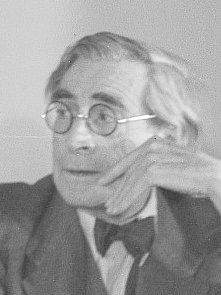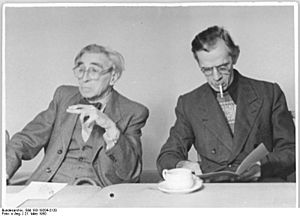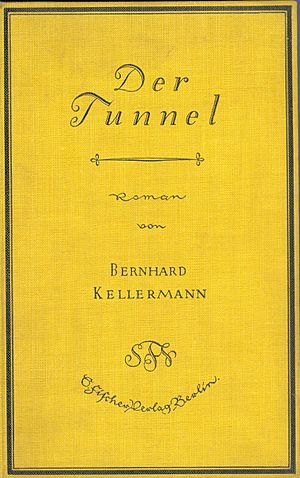Bernhard Kellermann facts for kids
Bernhard Kellermann was a German writer and poet. He was born on March 4, 1879, in Fürth, Germany. He passed away on October 17, 1951. He wrote many popular novels, including "Der Tunnel" (The Tunnel), which sold millions of copies.
Contents
The Life of Bernhard Kellermann
Bernhard Kellermann started studying at the Technical University Munich in 1899. He first studied general subjects. Later, he focused on German literature and painting.
He became known as a novelist around 1904. His early books, like Yester and Li, were very successful. By 1939, some of his books had been printed over 180 times. His novel Ingeborg (1906) was printed 131 times by 1939.
Before World War I, Kellermann traveled a lot. He visited the United States and Japan. His experiences from these trips inspired his novels. His book Das Meer (The Sea) was even made into a movie. Famous actors starred in this film.
"The Tunnel" and Other Important Works
His most famous book was Der Tunnel, published in 1913. This book was a huge hit for him and his publisher. It sold over one million copies. It was also translated into 25 different languages.
Over time, Kellermann's writing changed. His earlier works focused on feelings and descriptions. Later, his books started to look more closely at society. They often connected to real-world events.
During World War I, Kellermann worked as a correspondent. He wrote for the Berliner Tageblatt, a very important newspaper in Berlin. He published many reports about the war.
In 1920, his novel Der 9. November (The Ninth of November) came out. This book was critical of how soldiers and officers behaved towards people. Because of this book, Kellermann faced problems later during the Nazi era.
From 1922 onwards, he wrote many shorter stories and novellas. In 1926, Kellermann joined the Prussian poet academy. However, he was removed from it in 1933.
Travels and Challenges
In 1926, he divorced his wife, Lene Schneider-Kainer. He then went on a long two-year journey. He traveled through many countries, including Russia, Persia, India, Burma, Thailand, Vietnam, Tibet, Hongkong, and China.
During the Nazi era, his novel The Ninth November was banned. Copies of the book were publicly burned. Kellermann did not leave Germany. He also did not openly resist the Nazis. Instead, he wrote simpler, less serious novels during this time.
After the Nazi government fell, Kellermann became active again. He worked with Johannes R. Becher in the Cultural Association of the GDR. He was also a member of East Germany's parliament, called the Volkskammer. He led the Society for German-Soviet Friendship.
His strong support for East Germany after the war caused problems. Booksellers in West Germany stopped selling his books. Because of this, his name became less known. Even shortly before he died in 1951, he tried to bring writers from both German states together. He wanted them to discuss how to unite.
Bernhard Kellermann is buried in the New Cemetery in Potsdam. His grave is still there today.
Major Works by Bernhard Kellermann
- Yester und Li, novel (1904)
- Ingeborg, novel (1906)
- Der Tor, novel (1909)
- Das Meer [The Sea], novel (1910)
- Ein Spaziergang in Japan, Reisebericht [A Walk in Japan], travelogue (1910)
- Sassa yo Yassa. Japanische Tänze [Japanese Dances] (1911)
- Der Tunnel [The Tunnel], novel (1913)
- Der Krieg im Westen, Kriegsbericht [The war in the West, War Report] (1915)
- Krieg im Argonnerwald, Kriegsbericht [War in the Argonner Forest, War Report] (1916)
- Der 9. November [The Ninth of November], novel (1920)
- Die Heiligen [The Saints], novel (1922)
- Schwedenklees Erlebnis [Swedish Clover Experience] (1923)
- Die Brüder Schellenberg [The Brothers Schellenberg], novel (1925)
- Die Wiedertäufer von Münster [The Anabaptists of Muenster], drama (1925)
- Auf Persiens Karawanenstraßen [Persian Caravan Roads], travelogue (1928)
- Der Weg der Götter. Indien, Klein-Tibet, Siam [The Path of the Gods. India, Little Tibet, Siam], travelogue (1929)
- Die Stadt Anatol (City of Anatol), novel (1932)
- Jang-tse-kiang (1934)
- Lied der Freundschaft [Songs of Friendship] (1935)
- Das blaue Band [The Blue Band] (1938)
- Meine Reisen in Asien [My travels in Asia] (1940)
- Georg Wendlandts Umkehr [George Wendlandt's Reversal] (1941)
- Was sollen wir tun? [What are we to do?], essay (1945)
- Totentanz (1948)
- "Wir kommen aus Sowjetrußland" [We come from Soviet Russia], report (1948)
See also
 In Spanish: Bernhard Kellermann para niños
In Spanish: Bernhard Kellermann para niños
- The Tunnel (1935 film)
 | Selma Burke |
 | Pauline Powell Burns |
 | Frederick J. Brown |
 | Robert Blackburn |




